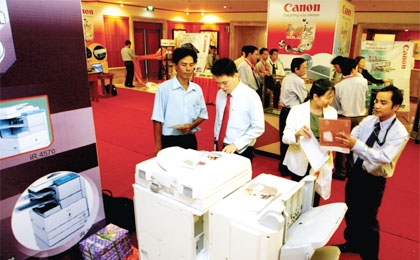FDI rivals turn up the heat on Vietnam

Japan’s Canon, the world’s leading office equipment manufacturer, last month announced it had chosen the Philippines for the establishment of a new factory producing laser printers and accessories. The plant will pave the way for the creation of a global production system.
Canon still manufactures printers in Vietnam, where it already has three factories, but the choice of the Philippine for its latest production expansion once again indicates Vietnam seems not Canon’s top priority for expansion. As further proof of this, in 2010, the Japanese company also built a new inkjet factory in Thailand.
Canon stated it realised many benefits from the new factory in Thailand, including the utilisation of its parts supplies, infrastructure and other aspects. And now, in the Philippines, the manufacturer anticipates access to a steady supply of workers, many of whom can communicate in English, adding value to this choice of location for new manufacturing.
While Vietnam still has advantages in attracting foreign direct investment (FDI) including political stability, geographical proximity to China and an abundant and cheap workforce, Hong Sun, general secretary of the Korean Chamber of Commerce and Industry in Vietnam (Korcham), said neighbouring countries had also emerged as attractive investment destinations.
In fact, a growing number of transnational companies like Canon are expanding investments in South East Asia to serve regional market, but are selecting Malaysia, Indonesia, Cambodia and Thailand over Vietnam. On February 8 this year, Toyota Motor Corporation, announced it planned to step up annual production capacity at its under-construction Karawang No. 2 Plant in Indonesia to 120,000 vehicles from an originally planned 70,000 vehicles.
Meanwhile, British-Dutch consumer product manufacturer Unilever last year decided to invest an additional $112 million, also in Indonesia, to meet the increasing demand for beauty products and ice cream in this country and other parts of Asia and Africa.
“I think Vietnam is losing advantages when it comes to competing with neighbouring countries,” said Nguyen Mai, chairman of Vietnam Association for Foreign Invested Enterprises, adding that the country was critically dropping behind its competitors in the race of attracting FDI.
In the Foreign Direct Investment Confidence Index, released by global management consulting firm A.T. Kearney, Vietnam is still listed among the 25 most attractive places for FDI in 2012. However, it is the only Asian nation to fall in the rankings this year, dropping from 12th in 2011 to 14th in 2012.
Vietnam’s new FDI commitments in 2011 dropped 26 per cent against 2010 to nearly $14.7 billion. The country’s FDI disbursement reached the same level as in 2010, or $11 billion, a positive number but nevertheless slow compared to the growth of its neighbours.
Indonesia made significant gains this year, moving from 20th to 9th place. Indonesia’s FDI inflows last year hit a record $19.3 billion, up 18.4 per cent year on year. Similarly, Malaysia moved up the index from 21st to 10th, and inflows jumped 537 per cent to $9 billion, according to A. T. Kearney.
“Yet, some companies are shifting production to Vietnam, lured by cheaper labour compared with China and deeper ports that can accommodate large container vessels sailing directly to the United States, Europe, and Asia,” A. T. Kearney said in an announcement.
Despite increased economic openness and relative political stability in Vietnam, the US consulting firm commented that investors might be stalling investment expansion in Vietnam because of concerns about high inflation, currency depreciation and strained public finances.
Vietnam’s inflation last year was 18.13 per cent, the highest in Asia. In 2011, Vietnam’s local currency was also the only Asian currency to depreciate against the US dollar, meaning losses for foreign manufacturers operating in Vietnam as they had to pay higher prices to import components.
Sun said many foreign investors would reconsider investment plans in Vietnam unless the government stabilised the economy and removed weaknesses in infrastructure and supporting industries.
What the stars mean:
★ Poor ★ ★ Promising ★★★ Good ★★★★ Very good ★★★★★ Exceptional
Related Contents
Latest News
More News
- Foreign leaders extend congratulations to Party General Secretary To Lam (January 25, 2026 | 10:01)
- 14th National Party Congress wraps up with success (January 25, 2026 | 09:49)
- Congratulations from VFF Central Committee's int’l partners to 14th National Party Congress (January 25, 2026 | 09:46)
- 14th Party Central Committee unanimously elects To Lam as General Secretary (January 23, 2026 | 16:22)
- Worldwide congratulations underscore confidence in Vietnam’s 14th Party Congress (January 23, 2026 | 09:02)
- Political parties, organisations, int’l friends send congratulations to 14th National Party Congress (January 22, 2026 | 09:33)
- Press release on second working day of 14th National Party Congress (January 22, 2026 | 09:19)
- 14th National Party Congress: Japanese media highlight Vietnam’s growth targets (January 21, 2026 | 09:46)
- 14th National Party Congress: Driving force for Vietnam to continue renewal, innovation, breakthroughs (January 21, 2026 | 09:42)
- Vietnam remains spiritual support for progressive forces: Colombian party leader (January 21, 2026 | 08:00)

 Tag:
Tag:


















 Mobile Version
Mobile Version